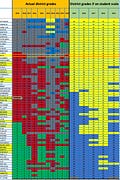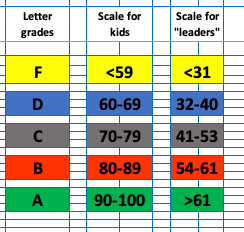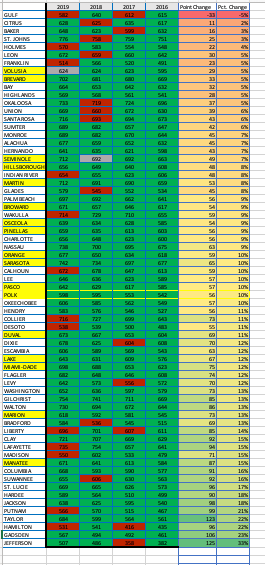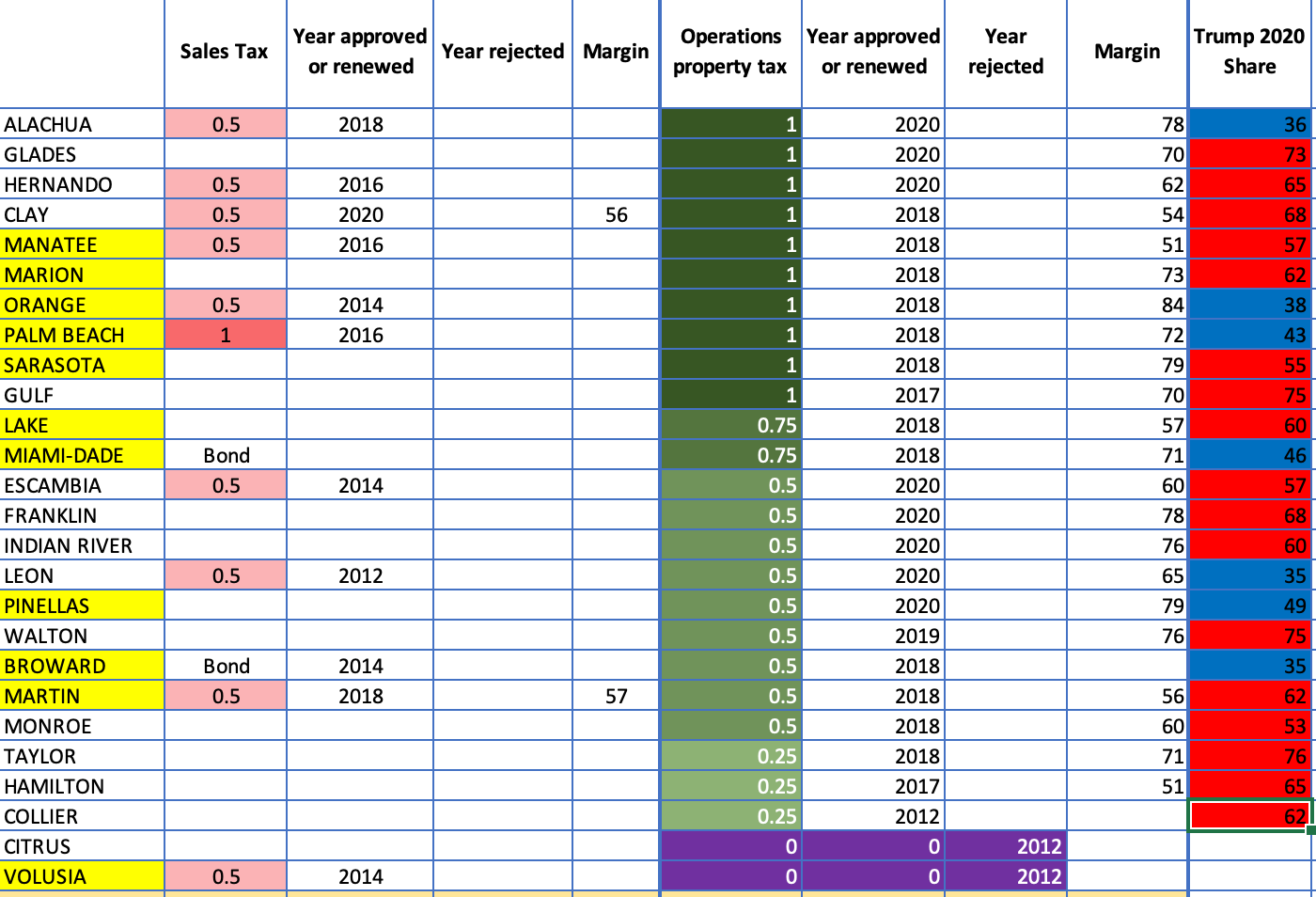A 62 gets "leaders" an "A" and kids a low "D": Florida's school grade fraud as American metaphor
The Kelli Stargel curve is profound in what it reveals about how people of power view accountability -- in education, in Florida, and in America. Any education "white paper" should start there.
Take a good look at the A-F grade scale Florida tells teachers to use for kids. Then look at it side-by-side with the A-F scale Florida uses for school and school district “grades.”
Notice anything odd about the scale for kids and the scale for educational leaders?
Why, the scales differ, don’t they? What’s that you say? Elected board members and unelected dictators from Jeb’s foundation and highly paid local leaders with great power seem to get graded on a ridiculous curve? A 90 gets a kid an A; but a superintendent or board member or legislator only needs a 62 for that bragging right?
Is that correct?
Why, yes, of course. With great power comes great fake achievement data. Call it the Kelli Stargel Curve.
Same counties, same numbers — two different scales. Fraud.
Now let’s take a look at the Kelli curve in action in the image below:
On the left, the image color-codes county school district letter “grades” received since 2010. The table is organized from “lowest” to “highest” scoring on the underlying grade point scoreboard.
On the right, you see the same exact counties and grades represented by the percentage of possible school grade points on the scoreboard they received to justify the letter grade, back through 2015. (That’s earliest year for percentages on DoE’s website.)
I have color-coded the right with the grades districts would have received on a student’s grade scale, not a district’s. The green and red As and Bs that dominate the left — and get bragged about endlessly and advertised on buses — disappear entirely on the right. Same counties, same numbers — two different scales.
Fraud.
In fact, if the state graded itself and its district superintendents and elected school boards in the way it instructs teachers to grade kids, every single district in the state would be a D or F (including Polk) — except one.
St. Johns County, Florida’s richest, would barely get a C with a 71.
I should be clear here: I’m describing state-level fraud in educational governance and policy that ground-level education workers must endure daily to try to help the human children also subjected to it. I do not blame any person willing to work in this model for the nonsense data it throws off. This is an indictment of power and leadership, not employees or kids.
I explored the human side of this fraud deeply in these two articles:
I’ll be doing much more, but here are those “four frauds” distilled — and you can see them play out on my spreadsheet if you look for them.
Incomprehensible complexity, tied to gaming of test results, that takes a 38-page technical paper to explain.
What's actually calculated isn't even a grade; it's a score. And 62 gets you an "A."
Schools with self-selected, screened enrollments are “graded” on the same scale as default, zoned schools.
Grades do not respect parental choice. The penalties involved punish and stigmatize parents and teachers who choose neighborhood schools.
The powerful people scale vs. everybody else’s scale
There are many and varying reasons — none of them healthy — why our country chose a person with Donald Trump’s psychology to wield ultimate power for four years.
But I think the number one reason is on display in Florida’s school grade fraud.
Put simply: the powerful live and judge by one scale; and everybody else lives and suffers on a different scale. There’s a powerful people grade scale — and an everybody else grade scale. This has always been a fixture of human history.
What’s different today — in my view — is how many powerful people pretend to believe we live in a post-power society. They’ve internalized and justified their own moral immunity so deeply that to have it questioned publicly feels like a personal violation. And the idea that they might suffer a personal consequence for public behavior or professional failure feels sacrilegious. Consequences are always for other people.
That pathology knows no party or ideology, although power and its interests tend to gravitate a little more to the Mitch McConnell Republican party right now. Democratic leaders have gotten pretty good at doing nothing about it with great technocratic regret and establishing little carve-outs for themselves within it. And don’t get me started on self-declared “Centrists.” They do not exist.
Indeed, I think the defining political question moving ahead has almost nothing to do with the dead vocabulary of “left” versus “right” versus “centrist.” It’s entirely about: are you full of shit about what you believe and advocate and do — or not? And what’s your relationship to power?
(I should be clear that I’m closer in background and current life status to the powerful people group than the non. But I also violate all the rules of Powerful People Club, starting with “never talk about Powerful People Club.” So we’ll see how long I keep my privileges. )
Illustrations for an actual Polk and Florida education “white paper”
I’m not gonna lie to you. I’m very proud of creating this spreadsheet, of which the images above are a subset of this larger image:
I find it a beautiful rendering of a Florida’s surrealistic grading system horror — a cheerfully-bright Excel data-visualization version of Goya’s “Saturn Devouring his Son”.
I have seen Goya’s black paintings in person; and they are creepy — “Saturn” particularly so. But they are no creepier than that school grade image, once you know what you’re looking at. I’ll be helping you out with that — in bite-sized chunks — in subsequent articles. There are a million human stories embedded in the color flow of those spreadsheet cells.
Anybody who wants the actual Excel document, email me at bitown1@gmail. com, and I’ll send it you.
My spreadsheet also includes this tab, which tracks and ranks district-level “improvement” on the fraudulent school/district grade scoreboard since 2016, which is a statistically significant date for reasons I’ll explain at a different time.
And this next tab illustrates how popular school-based educator-pay local taxation votes are, in both Trump counties (red) and Biden counties (blue). No teacher-pay property tax referendum has failed in Florida since 2012.
Take note Polk County. Waaaayyyyy more conservative counties than Polk have voted overwhelmingly to pay their education workers. What are we waiting for?
Take a look at this interactive map of Florida counties that are ahead of us in providing education resources.
https://public.tableau.com/shared/9GRGJ862W?:display_count=y&:origin=viz_share_link
Here’s the static image of it.
Many of our peer and regional competitor counties are moving. What are we doing?
So much time, so much money, so many revisions. LOL.
You will find none of this discussed in the Lakeland Leads “white paper” about education in Polk County — at least not in its current form. I’ve seen it; its only recommendation is to keep doing what Polk County has done since I’ve lived here (1999), at least, and maybe add at least one more high dropout rate charter school to the mix. And I would will predict that the superintendent goes to work for that high dropout rate/low ESE charter school, which is likely to be an “IDEA” charter school.
That’s what Lakeland Leads (which is mostly Gray Robinson’s David Hallock) and Kate Wallace consider their big idea. (No joke intended.) But IDEA is just a for-profit version of all the magnet and charters we’ve already had for a generation. Yawn.
Here’s a little background on IDEA schools, if you’re interested. They got in trouble recently for rolling in a private jet and doing uniform deals with family. Really. Also:
Special education enrollment in IDEA schools does not reflect state or national averages, as just 5.4% of IDEA students receive special education services compared with 9.6% statewide. This means in areas where IDEA enrollment is strong, traditional public schools serve a disproportionate share of students with disabilities, which can cause a financial strain on public schools.
Teacher turnover is also a critical issue. The state average years of experience for a teacher is 11.1 years compared with 5.1 years at IDEA campuses. Families become less connected to schools with high teacher turnover, and more taxpayer dollars must be allocated to continuously recruit and train novice teachers.
Sounds like every other magnet and charter school in Polk already.
In any event, I wrote recently about the retro mediocrity of Kate Wallace’s report, which Lakeland Leads remains afraid to release to the public. It's at this link. It is dominated by small scale, low knowledge thinking on the edges of a massive, longstanding grift designed to profit from kids who don’t require as much effort to educate as others.
So I had to chuckle at Board Member Kay Fields’ recent account of her meeting with Kate Wallace, who you’ll recall classily referred to the Polk district as “bottom-feeding” at a Florida Board of Education meeting.
Said Kay: “[Kate Wallace] is very much wanting to share with the entire board. They are making some final revisions. And so once that is done, she wants to present.”
LOL. Lakeland Leads has been paying Kate Wallace to do this boring report since early 2019. They’re almost two years into it; and they’re still afraid to let the public or the School Board see it without Kay Fields’ permission.
And even Kay, who is in political hock forever to the for-profit charter industry, sent Kate back to do revisions. Wow. I’m telling you; I’ve seen this report. It is glossy. It was not cheap to produce. It will not be cheap to revise.
As I said, some people get graded on curves with open book tests and endlessly open wallets. Kate’s a child of the inheritocracy employed by the House of Lords; so she’s among them.
It would all be very funny if Florida wasn’t grinding up education capacity and the future teacher supply with an endlessly self-serving and test-driven grifter approach to COVID-19-era schooling — on top of the failed Jeb model.
In any event, as always, you can have my white paper data and visualization, which I put together in my spare time over Thanksgiving weekend, for free. We’ll be discussing it quite a bit. Kate should feel free to include it in her revisions. She has my email address and phone number.
Who do you think will be more widely read?









Billy -- I love you and I love your work, and almost every time I read what you've written I nod furiously, but I think your grading scale comparison misses the point. There are all kinds of different scales for rating different things. A "passing" score for brake pads manufactured to spec is not going to be 90%. How reasonable a grading system is depends entirely on what you are trying to accomplish. I assume, since you say the district grade you are talking about is an average of the "school grade points" that each school gets, that what that number amounts to is an aggregation at the district level of the complicated system that brings together something like 25 different values to determine a particular school's grade (including growth in English and Math, growth in the lowest 20th percentile, graduation rate, etc). Rating this on a scale is really difficult, because these measures are so different. I mean, achieving growth in low-performing students is really hard, and a teacher who can bring that about in 60% of her students that meet that criteria is a rock star.
The real problem is not that leaders get let off too easy, as you are suggesting, but that the scale for the leadership recognizes that education to the standard that our society pursues is really hard, and that not every student is going to have the ability to meet that standard, and that this is out of people's control to a large degree, but this actually might be the only aspect of our current educational system that acknowledges that reality. The problem is that recognizing that different people have different abilities has been stigmatized and deemed, "The soft bigotry of low expectations" (hmm.. wasn't it a Bush who said that?), and so creating a more humane system to evaluate student learning becomes a non-starter. Of course, the standard the leaders apply to themselves is going to be more friendly toward that reality because the consequences touch them directly.
The lesson to draw here though is not, in my opinion, how unfair it is that the leaders get a looser standard, but that we need to take the implications of that standard they have chosen for themselves and use those to re-thing the outcomes we are seeking all the way down the line.